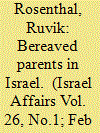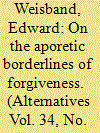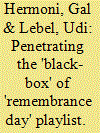| Srl | Item |
| 1 |
ID:
174031


|
|
|
|
|
| Summary/Abstract |
This article explores the changing voice of bereaved parents in Israel from 1948 to the present. Until the early 1980s, bereaved parents did not express their grief or protest publicly. Their bereavement was a strictly private matter. In 1982, shortly after the outbreak of the First Lebanon War, their grief and protest burst into the public sphere. From then on, their voice gained momentum and legitimacy and in time directly impacted the political decision-makers. The article defines four phases in the changing content, tone and style of parental bereavement – hidden, political, privatized, and moral – by analyzing and comparing six representative texts.
|
|
|
|
|
|
|
|
|
|
|
|
|
|
|
|
| 2 |
ID:
094316


|
|
|
|
|
| Publication |
2009.
|
| Summary/Abstract |
This article focuses on representations of forgiveness as adopted or assumed by processes of collective amelioration experienced in the aftermath of mass atrocity. It seeks to demonstrate how each representative approach to forgiveness captures some of the torment, pain, and suffering of survivor and successor generations, but also that each fails to accommodate the depths and complexities of personal grief and collective mourning. Too often transnational justice in the aftermath of political evil becomes grounded in assumptions of justice, truth, and apology that are severely delimited. Such strategic and theoretical perspectives are insufficiently attuned to the needs of bereavement as a political form because they fail to promote social solace by means of collective atonement on the part of survivor and successor generations who inherit the legacies of sorrow. If political bereavement conducive to collective amelioration is to occur in any one polity, it should be legitimated by a transnational system of "transnational legacy sites," exclusively devoted to the designation, protection, and intercultural connection of all the many places where political evil may be said to have occurred.
|
|
|
|
|
|
|
|
|
|
|
|
|
|
|
|
| 3 |
ID:
120361


|
|
|
|
|
| Publication |
2013.
|
| Summary/Abstract |
This article examines the musical repertoire broadcast on Israeli state radio stations on Remembrance Day. Commencing with the first Remembrance Day, Israeli radio stations have refrained from broadcasting songs that do not contribute to the glorification of the military mythology or failure to reinforce the consensual perception of national loss. In view of globalization - it might be assumed that Remembrance Day songs would undergo changes in tune with the times. From a musical point of view, new songs that belong to what Regev and Seroussi classify as 'globalizing Israel' penetrated into the nationalist arena. But, following Inglehart and Baker, these songs, despite their seemingly secular façade, remain limited hegemonic enclosures organized around the core of founding values. Apparently, this is an example of the process of glocalization of culture. The article seeks answers to the strategies employed to accommodate these new songs to the traditional ideology of the classical Remembrance Day songs and examines whether the mechanisms of legitimacy that enable the inclusion of new voices on Remembrance Day, can be identified. We argue that their choice is not arbitrary and that they illustrate the manner by which voluntary cultural entrepreneurs (musical editors) are co-opted in the postnational condition.
|
|
|
|
|
|
|
|
|
|
|
|
|
|
|
|